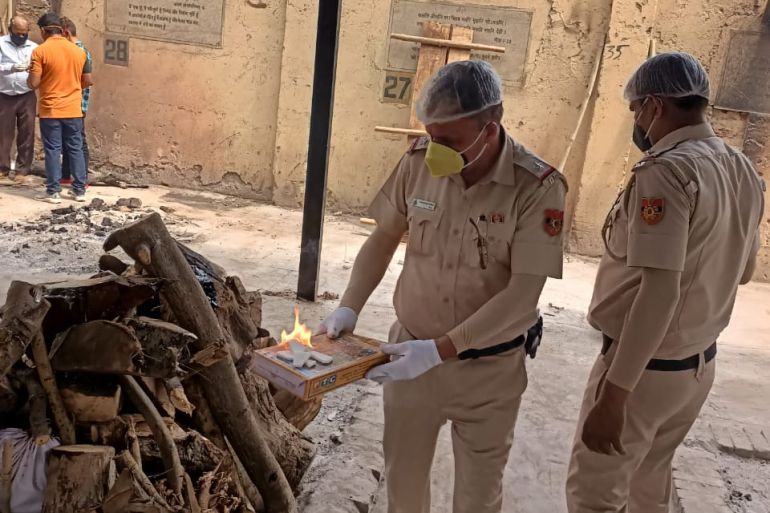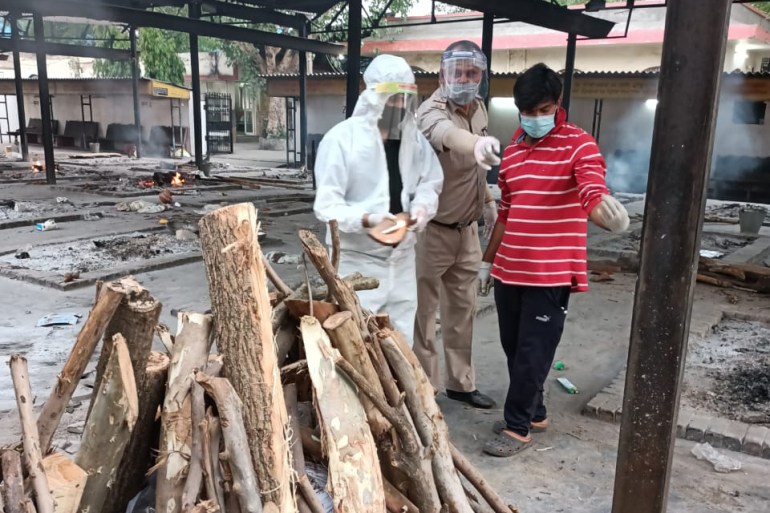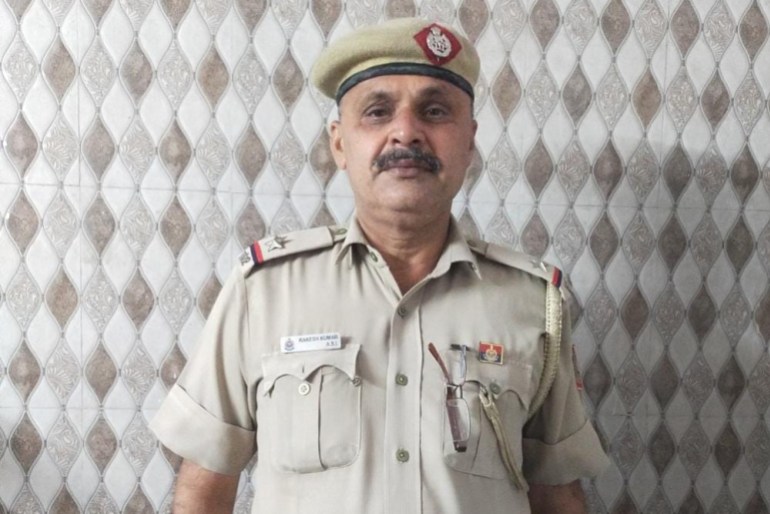‘True hero’: Indian police officer helping with COVID cremations
Rakesh Kumar has gone beyond the call of duty to help perform the last rites for as many as 1,300 coronavirus victims at Delhi’s Lodhi Crematorium.

New Delhi, India – A vicious second wave of the coronavirus is ripping through India, killing more than 250,000 people so far and affecting more than 23 million others – the second-worst outbreak in the world after the United States.
The surge in infections has overwhelmed the country’s front-line responders, including doctors and police personnel, as they come to terms with the magnitude of the unfolding humanitarian crisis.
Keep reading
list of 4 itemsMosques across India turned into COVID centres amid virus surge
India’s COVID spike sees slight fall amid WHO warning on strain
What we know about COVID variant first found in India
Amid the surging casualties – grossly under-reported by government agencies, according to experts – India’s poorly-funded healthcare system and severely understaffed police services have also been exposed.
The country of 1.35 billion people only has five hospital beds and 8.6 physicians per 10,000 population, while its police-to-population ratio of 138 officers for every 100,000 people is one of the lowest in the world.

But lightening the dystopia somewhat are inspiring stories of hope and courage, like that of Rakesh Kumar.
Kumar, 56, is an assistant sub-inspector (ASI) with the Delhi Police, posted at the Hazrat Nizamuddin police station in India’s capital since April 13.
He has gone beyond the call of duty to help distraught families perform the last rites for as many as 1,300 COVID victims at the city’s Lodhi Crematorium.
“In my three decades of police service, I have never experienced a crisis of this magnitude,” says the father of three who hails from Bagpat district in neighbouring Uttar Pradesh state.
“Dead bodies keep piling high at the crematorium due to the space crunch and relentless deaths. It’s heart-wrenching. But we are trying to give people dignity in death.”
‘True hero’
Such has been Kumar’s devotion to his job that he even postponed the wedding of his 25-year-old daughter Rhea from May 7 to August due to his tough assignment.
“I don’t want to take leave at a time when people need me. My family and superiors support me fully in this. My daughter told me unblinkingly that ‘Papa, please don’t come back. You’re doing the right thing’. Their support gives me strength to do my job well,” says the police officer who often begins his 10-12 hour shift at 7am.
“Many COVID patients’ bodies arrive at the site unaccompanied by even a single family member. Even close family are shunning patients due to fear of catching the dreaded virus. But I ensure that the departed’s last rites are properly conducted,” says Kumar, who lives alone in a tiny barrack at the Nizamuddin police station.
Though Kumar’s duty involves maintaining law and order around the crematorium and directing mourners who arrive to bid their loved ones goodbye, he performs many other tasks as well, including helping to carry bodies from ambulances to funeral pyres, organising wood from nearby shops for the last rites, helping families light the pyres, and even giving poor families money to buy wood at times.

Does it scare him to be exposed for long hours in a highly infected zone?
“I have taken both shots of the vaccine. I also wear a mask, face shield, gloves, and take a hot water bath as soon as I reach home. I think that’s enough,” says Kumar.
The police officer’s conscientiousness has elicited praise from his department.
“COVID time has thrown up some real heroes. ASI Rakesh deserves highest degree of praise and encouragement. In fact, it is men like him who keep the society going. Something that many need to learn,” Delhi Police Commissioner SN Shrivastava tweeted.
Kumar’s superior Manoj Sinha, who is the assistant commissioner of police for Southeast Delhi, says the police officer has set an example for millions.
“He has been there to feel the pain of thousands who arrive at the crematorium alone with dead bodies of their loved ones. Some are helpless to even take the body up to the funeral pyre. Being his senior, I have advised him to take all precautions before he helps people,” he says. “He is a true hero.”
Kumar’s work has shown police in a good light, a contrast to frequent images and videos of aggressive police officers enforcing social distancing norms on the public, often subjecting them to on-the-spot punishments.
Video of police officers upending food carts and wielding sticks on hapless migrant labourers returning home due to coronavirus lockdown has triggered an uproar on Indian social media.
Kumar says many police personnel are working in close proximity to people infected with COVID-19, some of whom even lack PPE equipment and other critical resources to protect themselves from the deadly disease.
Despite these handicaps, they have risen to the challenge of enforcing lockdowns and promoting public health, he adds.
“For the police, the lockdowns create challenging conditions like violations, violence and breakdown of public order. We work under tough conditions, but I want to reassure people that we are doing our best under the circumstances,” he concludes.